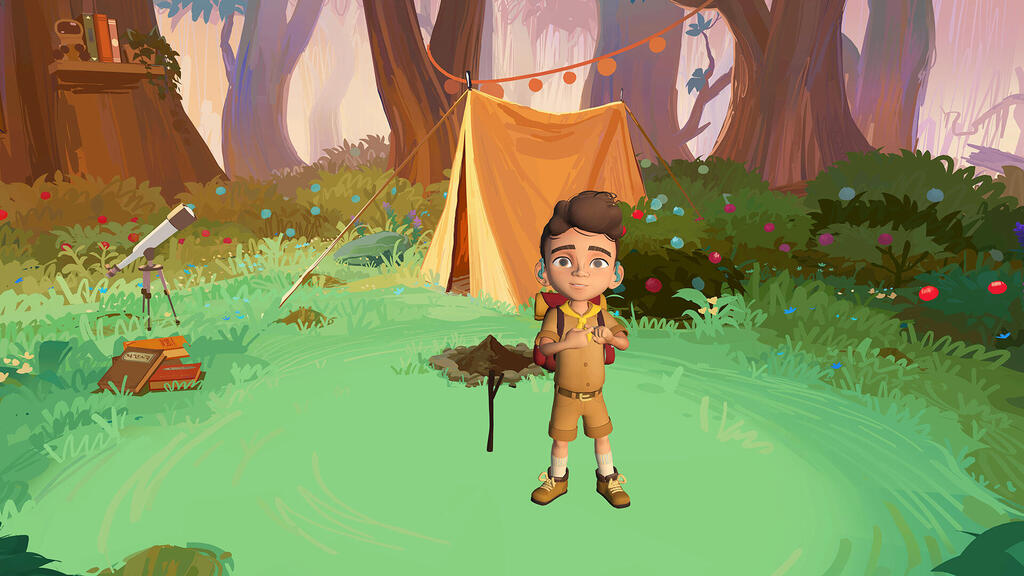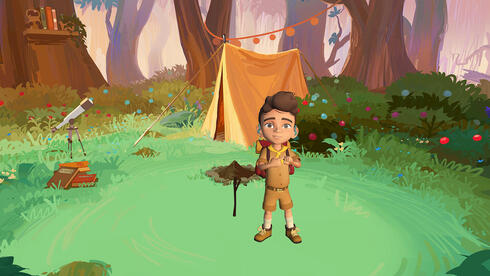
Eddie and I: Israeli project at Venice Film Festival teaches sign language through VR
Immersive experience teaches audiences sign language through the eyes of a deaf child.
“Eddie and I,” the only Israeli production participating in the Venice Film Festival, which opens on Wednesday, tells the story of a deaf child who requires hearing people to learn five words in sign language to communicate with him. The words are friends, try, look, relax, and help. In an interview with the project’s creator, Maya Shekel, she signs them for me with her hands.
“Eddie and I” is not a traditional film but an interactive VR experience, featured in a special program at the festival designed for works of this kind. “This is the largest and most prestigious competition for the very niche field I work in,” says Shekel. A graduate of Tel Aviv University’s Department of Digital Media, specializing in virtual, augmented, and mixed reality, she previously created an augmented reality project, Virtual Zoo, a reconstruction of the old Tel Aviv Zoo. Adopted by the Tel Aviv Municipality, it transformed the zoo’s former grounds into a tourist attraction. After graduating, Shekel (32) founded Moosh Studio, which combines storytelling and technology with the goal of creating social impact. Within this framework, she developed her latest project, which merges VR with immersive storytelling.
“Eddie and I” is a 25-minute VR experience in which participants put on headsets and accompany Ron, a deaf boy who is afraid of his first camping trip. To comfort him, his mother invents a story about a lovable monster named Eddie who will watch over him. Ron drifts into sleep and dreams of a forest, his nightmare, where he meets Eddie for the first time. Eddie is us: everyone wearing the VR headsets becomes the monster. Very quickly, participants realize they cannot communicate with Ron, since he is deaf and they don’t know sign language.
Using VR hand-tracking technology, they learn five signs, friends, try, look, relax, and help, and use them to guide Ron through his fears. By helping him, participants also confront their own. At the end of the forest adventure inside Ron’s dream, he is ready for the camping trip, while we have gained both a friend and a new language.
“The inspiration for the project came from my niece, who is now 12 and deaf,” Shekel explains. “It also grew from my desire to explore broader challenges of alienation and cultural and social gaps. We worked with nonprofits like Shema and Beit Micha to ensure the experience was authentic, sensitive, and meaningful for its audience.”
The project cost €650,000, a sum Shekel admits she once thought unimaginable. An Israeli-German-French co-production, it was supported by major partners including Meta, the Unity game engine, and Israeli film funds Makor and Gesher, among others. Distribution is managed by a Paris-based company, with plans to bring the project to children’s museums and schools worldwide.
Related articles:
Shekel emphasizes how much more developed the VR industry is in Europe compared to Israel: “There I saw how professional and profitable the field is. In Israel, filmmaking is difficult in general, and in our niche even more so. I try to encourage people here to see the power of this technology.” She has also taught VR and storytelling at Reichman University, where she supervised projects in mental health VR therapy, including AI-powered avatars helping trauma survivors.
On AI in creative work, Shekel says: “It will only make things easier. Today, three seconds of animation can take a full day’s work. AI makes it faster. Still, we will continue to work carefully with animators to preserve storytelling quality.”
Shekel has been working on the project since April 2023, alongside producer Yuval Kella and screenwriter Nitay Dagan. “It was a Sisyphean task involving animators, musicians, and programmers from all over the world. Everyone worked in parallel, even during two of the most difficult years Israel has known.” The project won first prize at Paris’s New Images Festival and was presented at the Tribeca Film Festival, which opened critical doors for collaboration and support.
“The project is about deafness,” Shekel says, “but it also became a way for hearing people to learn how to be with someone different and overcome their fear. We didn’t want to simply say: ‘Now you know what it’s like to be deaf.’ We hope it will inspire encounters across differences.”
She adds: “Israel is more polarized than ever. A project like this, offering a meeting with someone different, can serve as a metaphor for all kinds of encounters. Children are naturally drawn to new technologies, far more than to outdated workshops by the Ministry of Education. I want them to experience that it’s possible to see people differently.”
Asked whether she is preparing for protests in Venice, Shekel replies: “Anything can happen there, and I am prepared. If questions arise, I will tell protesters: if you cannot say both ‘bring back the hostages and stop the war,’ then you are denying reality, just as some Israelis deny the hunger and suffering in Gaza. Neither can be ignored. I support both an agreement to end the war and a deal to release the hostages. I am not my government.”
